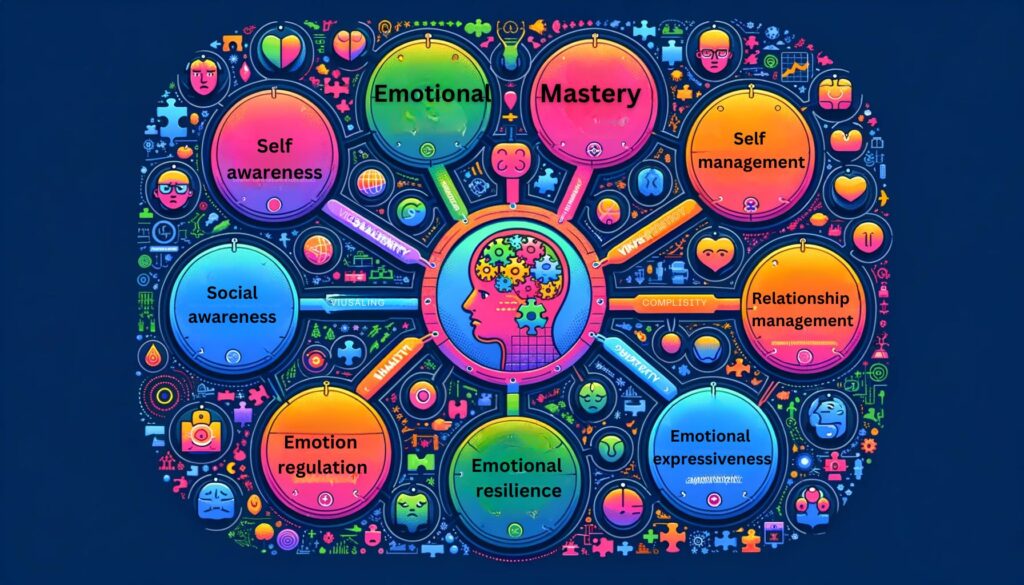Unlock Your Potential with Emotional Mastery Techniques

Welcome to an exploration of the power of emotional mastery techniques and how they can unlock your potential for personal and professional success. Emotional mastery involves managing emotions, developing emotional intelligence, and cultivating emotional well-being. By practicing self-regulation and enhancing our emotional control, we can achieve greater emotional balance and overall well-being. In this article, I will provide an overview of emotional intelligence, its key components, benefits, measurements, and guidelines for further development. Together, we will embark on a journey towards unlocking the power of our emotions and achieving a happier, more fulfilling life.
Key Takeaways:
- Emotional mastery involves managing emotions, developing emotional intelligence, and cultivating emotional well-being.
- By practicing self-regulation and enhancing emotional control, we can achieve greater emotional balance and overall well-being.
- Emotional intelligence encompasses abilities like self-awareness, self-management, social awareness, and relationship management.
- Emotionally intelligent individuals experience greater mental health, career success, and relationship satisfaction.
- Measuring emotional intelligence can provide insights into relative strengths and weaknesses, guiding further development.
Understanding Emotional Intelligence and Its Components
The concept of emotional intelligence (EI) encompasses a set of skills that enable individuals to recognize, understand, and manage their own emotions, as well as navigate relationships effectively. It was first introduced by psychologists Peter Salovey and John Mayer in 1990 as a subset of social intelligence. Emotional intelligence consists of several key components that collectively contribute to emotional mastery:
- Self-awareness: This component involves recognizing and understanding one’s own emotions, strengths, and weaknesses. It includes being able to accurately assess and label emotions.
- Self-management: Self-management refers to the ability to regulate and control one’s emotions effectively. It includes techniques for managing stress, impulse control, and maintaining emotional balance.
- Social awareness: Social awareness encompasses the ability to perceive and understand the emotions of others. It involves empathy, perspective-taking, and recognizing social cues.
- Relationship management: Relationship management involves the ability to effectively navigate and influence social interactions. It includes skills such as communication, conflict resolution, and building and maintaining healthy relationships.
By mastering these components of emotional intelligence, individuals can gain a deeper understanding of their emotions, enhance their self-control and empathy, and improve their ability to connect with others. Emotional intelligence lays the foundation for achieving personal and professional success by fostering emotional well-being and resilience.
“Emotional intelligence is not the absence of emotions, but rather the ability to understand and manage them effectively.”
Additional Components of Emotional Intelligence

In addition to the four key components mentioned above, there are other aspects that contribute to emotional intelligence:
- Emotion Regulation: Emotion regulation involves strategies to manage and modify emotions in response to different situations. It includes techniques like deep breathing, mindfulness, and cognitive reappraisal.
- Emotional Expressiveness: Emotional expressiveness refers to the ability to express emotions appropriately and effectively. It involves expressing emotions in a way that is authentic and respectful.
- Emotional Resilience: Emotional resilience is the capacity to bounce back from setbacks and adapt to challenges. It involves maintaining a positive attitude, staying optimistic, and persevering in the face of adversity.
| Components of Emotional Intelligence | Definition |
|---|---|
| Self-awareness | The ability to recognize and understand one’s own emotions and tendencies. |
| Self-management | The ability to regulate and control one’s own emotions and behaviors. |
| Social awareness | The ability to perceive and understand the emotions of others. |
| Relationship management | The ability to effectively navigate and manage social interactions and relationships. |
| Emotion regulation | The ability to manage and modify emotions in response to different situations. |
| Emotional expressiveness | The ability to express emotions appropriately and effectively. |
| Emotional resilience | The capacity to bounce back from setbacks and adapt to challenges. |
The Benefits of Emotional Intelligence
Extensive research over the past few decades has demonstrated the diverse benefits of emotional intelligence (EI) in various life domains. Emotionally intelligent individuals experience greater mental health, job performance, leadership excellence, and relationship satisfaction. Higher EI is associated with lower anxiety, depression, and substance misuse, as well as higher optimism, resilience, coping skills, life satisfaction, and self-esteem. In the workplace, EI is linked to employee performance, motivation, leadership potential, and organizational commitment. In relationships, higher EI leads to better communication, conflict resolution, intimacy, and relationship satisfaction.
Table: Examples of Emotional Intelligence Benefits
| Domain | Benefits |
|---|---|
| Mental Health | Reduced anxiety, depression, and substance misuse; increased optimism, resilience, coping skills, life satisfaction, and self-esteem |
| Career | Improved job performance, motivation, leadership potential, and organizational commitment |
| Relationships | Enhanced communication, conflict resolution, intimacy, and relationship satisfaction |
These benefits highlight the importance of developing emotional intelligence and incorporating it into various aspects of life. By increasing our emotional intelligence, we can enhance our mental well-being, excel in our careers, and cultivate fulfilling relationships. Understanding and managing our emotions effectively can lead to better decision-making, improved communication, and increased self-awareness. Developing emotional intelligence is a valuable investment in our personal and professional growth, enabling us to navigate the complexities of life with greater ease and success.
Measuring Emotional Intelligence
Measuring emotional intelligence (EI) is essential for gaining insights into our emotional strengths and weaknesses. The most common method for measuring EI is through self-report questionnaires and tests. These assessments provide individuals with valuable information about their ability to perceive, understand, and manage emotions.
The Mayer-Salovey-Caruso Emotional Intelligence Test (MSCEIT) and the Schutte Self-Report EI Test (SSEIT) are widely used tools for measuring EI. These tests consist of a series of questions that assess specific abilities related to emotional intelligence. By completing these assessments, individuals can gain a deeper understanding of their emotional intelligence and identify areas for further development.
Self-report questionnaires and tests provide a comprehensive evaluation of emotional intelligence. They measure various components of EI, including self-awareness, self-management, social awareness, and relationship management. Through these assessments, individuals can gain insights into their emotional strengths and areas that require improvement.
The Benefits of Emotional Intelligence Measurement
Measuring emotional intelligence offers several benefits. It allows individuals to gain a better understanding of their emotions and how they influence their thoughts, behaviors, and relationships. By assessing emotional intelligence, individuals can identify areas for improvement and develop strategies to enhance their emotional well-being.
“Measuring emotional intelligence offers individuals the opportunity to gain insights into their emotional strengths and areas for improvement.”
Additionally, measuring emotional intelligence provides a baseline for tracking personal growth and development. By regularly assessing EI, individuals can monitor their progress and measure the effectiveness of strategies implemented to enhance emotional intelligence skills.
| Benefits of Measuring Emotional Intelligence |
|---|
| Gaining insights into emotional strengths and weaknesses |
| Identifying areas for improvement |
| Developing strategies for enhancing emotional well-being |
| Tracking personal growth and development |
Developing Emotional Intelligence
Developing emotional intelligence is a transformative process that involves honing various skills and adopting new habits. Here are some key tips to help you develop emotional intelligence:
- Enhance Self-Awareness: Take time to reflect on your emotions, triggers, and patterns of behavior. Pay attention to how you feel in different situations and identify your strengths and weaknesses.
- Practice Self-Regulation: Learn to manage your emotions effectively by developing self-control. Take deep breaths, count to ten, or engage in relaxation techniques to calm yourself during stressful moments.
- Cultivate Empathy: Put yourself in the shoes of others and try to understand their perspectives and emotions. Practice active listening and show genuine compassion towards others.
- Develop Relationship Skills: Build strong and meaningful connections with others by improving your communication and conflict resolution skills. Invest time in nurturing your relationships and engaging in collaborative problem-solving.
“Emotional intelligence is not just about knowing and understanding emotions; it’s about putting that knowledge into action and making positive changes in our lives.”
Remember that developing emotional intelligence is a continuous journey that requires practice and perseverance. By actively applying these tips, you can unlock your potential to navigate emotions effectively and cultivate fulfilling relationships.
| Tips to Develop Emotional Intelligence |
|---|
| Enhance self-awareness |
| Practice self-regulation |
| Cultivate empathy |
| Develop relationship skills |
Mindfulness Meditation for Emotional Mastery
Mindfulness meditation is a powerful technique that can promote emotional awareness, reduce stress, and alleviate anxiety. By practicing mindfulness, individuals can develop a greater understanding of their emotions and cultivate a sense of inner calm and balance.
Mindfulness meditation involves being present in the moment and accepting thoughts and feelings without judgment. By focusing on the present moment and observing thoughts and emotions as they arise, individuals can develop a heightened sense of self-awareness. This increased awareness allows individuals to gain insight into their emotional patterns and triggers, enabling them to respond to challenging situations with greater clarity and composure.
“Mindfulness meditation is the key to unlocking emotional mastery. By cultivating a non-judgmental awareness of our thoughts and emotions, we can develop a healthier relationship with our feelings and gain a greater sense of emotional control.”
Regular practice of mindfulness meditation has been shown to have numerous benefits for emotional well-being. Research suggests that it can reduce stress, anxiety, and depressive symptoms (Chiesa & Serretti, 2011). It can also improve attention and concentration, enhance cognitive flexibility, and promote overall psychological well-being (Tang et al., 2015).
The Benefits of Mindfulness Meditation for Emotional Mastery

- Enhanced emotional awareness: Mindfulness meditation allows individuals to develop a deeper understanding of their emotions, enabling them to better recognize and regulate their feelings.
- Stress reduction: By practicing mindfulness, individuals can reduce the impact of stress on their well-being and cultivate a greater sense of inner calm and relaxation.
- Anxiety reduction: Mindfulness meditation has been found to be effective in reducing symptoms of anxiety and promoting a more balanced emotional state.
Overall, mindfulness meditation is a valuable tool for developing emotional mastery. By cultivating a regular mindfulness practice, individuals can gain insight into their emotions, reduce stress and anxiety, and cultivate a greater sense of emotional well-being and balance.
| Benefits of Mindfulness Meditation for Emotional Mastery |
|---|
| Enhanced emotional awareness |
| Stress reduction |
| Anxiety reduction |
Cognitive Reappraisal for Emotional Mastery
Emotional mastery involves developing the ability to effectively manage challenging situations and reframe negative thoughts. Cognitive reappraisal is a technique that can help individuals cultivate a positive outlook by consciously changing their perspective on difficult experiences or emotions. By reframing negative thoughts, individuals can shift their focus towards more constructive and optimistic interpretations, leading to increased emotional well-being and resilience.
Cognitive reappraisal allows individuals to challenge their initial emotional reactions and consider alternative interpretations or explanations. By reframing negative thoughts, individuals can create new cognitive pathways that promote a more positive outlook on challenging situations. This technique is especially beneficial in situations where emotions may be overwhelming or when individuals find themselves stuck in negative thought patterns.
To practice cognitive reappraisal, individuals can start by identifying a negative thought or emotion and questioning its accuracy or validity. By actively challenging negative thoughts and considering alternative perspectives, individuals can reframe the situation in a way that promotes a more positive and productive response. Through consistent practice, cognitive reappraisal can become a valuable tool for emotional mastery and personal growth.
Progressive Muscle Relaxation for Emotional Mastery
One effective technique for achieving emotional mastery is progressive muscle relaxation (PMR). PMR is a relaxation technique that involves tensing and then releasing different muscle groups in the body. By systematically tightening and relaxing muscles, individuals can reduce physical tension and promote a state of deep relaxation. This technique is particularly helpful for reducing anxiety, stress, and physical symptoms of tension.
To practice PMR, find a quiet and comfortable space where you can fully focus on your body and sensations. Begin by taking a few deep breaths to center yourself. Starting with your toes, gradually tense the muscles in that area for a few seconds, then release and let go of the tension. Move systematically through each muscle group, working your way up toward your head. Pay attention to the sensations you experience as you tense and release each muscle group.
Progressive muscle relaxation can be a valuable tool in promoting emotional well-being. By incorporating this technique into your daily routine, you can learn to release physical tension, reduce anxiety, and create a sense of calmness in your body. When practiced regularly, PMR can help you develop greater control over your emotional state and enhance your overall emotional mastery.
| Benefits of Progressive Muscle Relaxation for Emotional Mastery |
|---|
| Reduces physical tension |
| Promotes relaxation and calmness |
| Helps to alleviate anxiety and stress |
| Enhances emotional control and well-being |
Tips for Effective Progressive Muscle Relaxation:
- Find a quiet and comfortable space
- Start with deep breathing to center yourself
- Systematically tense and release each muscle group
- Pay attention to sensations and focus on relaxation
- Practice regularly for maximum benefits
“Progressive muscle relaxation has been shown to be an effective technique for reducing physical tension and promoting relaxation. By incorporating this technique into your routine, you can gain greater control over your emotional state and improve your overall well-being.”
Physical Exercise for Emotional Mastery
Physical exercise is a powerful tool for regulating emotions and improving overall well-being. When we engage in regular physical activity, our brain releases endorphins, which are natural chemicals that promote a positive mood and reduce stress. Through exercise, we can experience significant improvements in our emotional state, leading to enhanced emotional balance and control.
Studies have consistently shown that physical exercise is associated with mood improvement and stress reduction. Whether it’s going for a brisk walk, practicing yoga, or participating in team sports, any form of exercise can have a positive impact on our emotions. Physical activity not only helps us release pent-up energy and tension but also provides a healthy outlet for managing stress and anxiety.
When we engage in physical exercise, our focus shifts from daily worries and stressors to the present moment. This shift in focus allows us to temporarily disconnect from negative thoughts and emotions, promoting a sense of clarity and relaxation. Additionally, the act of exercising can serve as a form of self-care, empowering us to prioritize our well-being and invest in our emotional health.
The Benefits of Physical Exercise for Emotional Mastery:
- Improved mood and overall well-being
- Reduced stress and anxiety
- Enhanced emotional balance and control
- Increased self-esteem and self-confidence
- Healthy outlet for managing emotions
Whether it’s a daily jog, a dance class, or a gym session, incorporating physical exercise into our routine can have profound effects on our emotional mastery. By making exercise a regular part of our lives, we can harness the power of endorphins, improve our mood, reduce stress, and achieve greater emotional well-being.
| Type of Exercise | Benefits |
|---|---|
| Cardiovascular exercise (e.g., running, cycling) | Boosts mood, reduces stress, improves endurance |
| Strength training (e.g., weightlifting, resistance exercises) | Increases self-confidence, improves body image, promotes mental resilience |
| Mind-body exercises (e.g., yoga, tai chi) | Enhances relaxation, reduces anxiety, improves mindfulness |
| Social sports or group activities (e.g., soccer, group fitness classes) | Fosters social connections, boosts motivation, provides a sense of belonging |
Journaling for Emotional Mastery
Journaling is a powerful tool for enhancing emotional clarity, understanding, and processing. By putting pen to paper, we can delve deep into our thoughts and feelings, gaining a greater sense of self-awareness and insight. Journaling allows us to capture the raw emotions and experiences that shape our lives, offering a unique way to reflect on and make sense of them.
Through journaling, we can explore our emotions in a safe and private space. By writing down our thoughts and feelings, we can gain distance from them and observe them objectively. This process can help us identify patterns, triggers, and underlying causes of our emotions, leading to a greater understanding of ourselves.
Furthermore, journaling provides an outlet for processing difficult emotions. By expressing our emotions on paper, we can release pent-up feelings, reduce stress, and find solace. It allows us to explore different perspectives, challenge negative thought patterns, and develop healthier coping mechanisms.
The Benefits of Journaling for Emotional Mastery
Research has shown that journaling can have a significant impact on our emotional well-being. According to a study published in the journal Psychosomatic Medicine, expressive writing, such as journaling, has been found to reduce anxiety and boost immune function. Another study published in the American Psychological Association found that journaling about emotional experiences for just a few minutes a day can lead to improved mood and overall well-being.
By regularly journaling, we can cultivate emotional mastery by gaining a deeper understanding of our emotions, improving our ability to regulate them, and developing greater resilience in the face of challenges. Journaling can serve as a valuable tool for personal growth and self-discovery, empowering us to navigate our emotions with greater clarity and purpose.
| Benefits of Journaling for Emotional Mastery |
|---|
| Enhances emotional clarity and understanding |
| Facilitates emotional processing and release |
| Reduces stress and anxiety |
| Improves overall emotional well-being |
| Cultivates self-awareness and personal growth |
In conclusion, journaling is a valuable practice for anyone seeking emotional mastery. By dedicating time to regular journaling, we can deepen our understanding of ourselves, process challenging emotions, and cultivate greater emotional well-being. Whether it’s through daily reflections, gratitude journaling, or exploring specific emotions or experiences, the act of journaling can empower us on our journey toward emotional mastery.
Integrating Emotional Intelligence for Success
Emotional intelligence is not just a concept to understand; it is a skill to be integrated into our daily lives. By embracing emotional intelligence and incorporating emotional mastery techniques, we can unlock our true potential and achieve success in various domains. The integration of emotional intelligence skills, such as self-awareness, self-regulation, empathy, and relationship management, can lead to personal growth, better decision-making, effective communication, and stronger relationships.
Cultivating emotional resilience is a key aspect of integrating emotional intelligence. It involves developing the ability to bounce back from setbacks, adapt to change, and maintain an optimistic outlook in the face of challenges. With emotional resilience, we can navigate difficult situations with greater ease, remain calm under pressure, and find creative solutions to problems. It is a vital skill that enables us to maintain our emotional well-being and thrive in both personal and professional settings.
Related Content: Manifest Your Dream Life
Another important aspect of integrating emotional intelligence is fostering self-growth. This involves a continuous commitment to self-improvement and learning from our experiences. By reflecting on our emotions, thoughts, and behaviors, we can gain valuable insights into ourselves and identify areas for personal development. This self-awareness allows us to make conscious choices that align with our values and goals, leading to greater fulfillment and success.
Ultimately, integrating emotional intelligence for success is about creating a harmonious balance between our thoughts, emotions, and actions. It empowers us to make informed decisions, build meaningful connections, and navigate the complexities of life with grace and resilience. By embracing emotional intelligence and making it an integral part of our lives, we can unlock our full potential and achieve the success and well-being we desire.
Conclusion
In conclusion, emotional mastery is a transformative journey that empowers individuals to unlock their potential by developing emotional intelligence and practicing various techniques. By cultivating self-awareness, self-regulation, empathy, and relationship skills, individuals can achieve emotional balance and experience numerous benefits in their personal and professional lives.
One of the key benefits of emotional mastery is improved mental health. By understanding and managing their emotions effectively, individuals can reduce anxiety, depression, and stress, while increasing optimism, resilience, and life satisfaction. Additionally, emotional mastery contributes to career success, as it enhances job performance, leadership potential, and organizational commitment.
Furthermore, emotional mastery enables individuals to build stronger and more fulfilling relationships. By improving communication, conflict resolution, and empathy, individuals can experience greater intimacy, connection, and relationship satisfaction. This, in turn, leads to a happier and more fulfilling life.
In summary, emotional mastery is a vital process that empowers individuals to harness the power of emotional intelligence and apply it to their daily lives. By embracing emotional mastery techniques and integrating them into their routines, individuals can achieve greater self-awareness, emotional balance, and success in various domains. The journey of emotional mastery is not only beneficial for personal growth but also contributes to enhanced mental health, career success, and relationship satisfaction, ultimately leading to a happier and more fulfilling life.
FAQ
What is emotional intelligence?
Emotional intelligence refers to the ability to recognize, understand, and manage our own emotions and relationships.
What are the key components of emotional intelligence?
The key components of emotional intelligence include self-awareness, self-management, social awareness, and relationship management.
What are the benefits of emotional intelligence?
Emotional intelligence has been found to benefit mental health, job performance, leadership excellence, and relationship satisfaction.
How is emotional intelligence measured?
Emotional intelligence is most commonly measured through self-report questionnaires like the Mayer-Salovey-Caruso Emotional Intelligence Test (MSCEIT) and the Schutte Self-Report EI Test (SSEIT).
How can I develop my emotional intelligence?
Tips to develop emotional intelligence include increasing self-awareness, improving self-regulation, cultivating empathy and social awareness, developing relationship skills, seeking feedback and self-reflection, expanding emotional knowledge, gaining life experience, and practicing consistently.
What is mindfulness meditation and how does it help with emotional mastery?
Mindfulness meditation is a practice that involves being present in the moment and accepting thoughts and feelings without judgment. Regular practice can enhance emotional awareness, improve emotional control, and reduce stress and anxiety.
What is cognitive reappraisal and how does it contribute to emotional mastery?
Cognitive reappraisal is a technique that involves reframing negative thoughts and emotions into more positive or neutral ones. It helps in managing difficult emotions, reducing stress, and improving overall emotional well-being.
What is progressive muscle relaxation and how does it promote emotional mastery?
Progressive muscle relaxation is a technique that involves tensing and relaxing different muscle groups to reduce physical tension and promote relaxation. It can help release stress, reduce physical symptoms of anxiety, and create a sense of calm and relaxation in the body.
How does physical exercise contribute to emotional mastery?
Physical exercise releases endorphins and other feel-good chemicals in the brain, leading to improved mood, reduced stress, anxiety, and depression. Regular exercise also promotes self-esteem and overall well-being, contributing to emotional balance and control.
How can journaling help with emotional mastery?
Journaling enhances emotional mastery by providing a tool for emotional expression and understanding. By writing down thoughts and feelings, individuals can gain greater clarity and insight into their emotions, as well as develop strategies for managing them effectively.
How can I integrate emotional intelligence for success?
Integrating emotional intelligence skills, such as self-awareness, self-regulation, empathy, and relationship management, can lead to personal growth, better decision-making, effective communication, and stronger relationships.
Source Links
- https://medium.com/@dave.seidy/emotional-mastery-techniques-for-regulating-and-managing-your-emotions-da5f8f61c995
- https://medium.com/@gmpantazis/unlocking-the-secrets-of-emotional-mastery-how-to-harness-the-power-of-your-feelings-and-connect-38d58f33a00d
- https://passionstruck.com/emotion-regulation-techniques/







